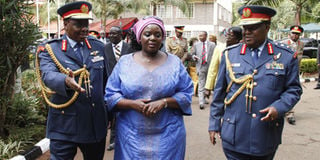Military to help police secure roads

Defence Cabinet Secretary Raychelle Omamo having a word with The commandant of National Defence College Lt Gen Jackson Waweru (left) and Chief of the Defence Forces Julius Karangi (right) on May 29, 2014. Plans are under way for the Kenya Defence Forces (KDF) to help the police to secure major roads leading to Nairobi and Mombasa as the government tightens security in the wake of terrorist threats. Photo/ JEFF ANGOTE (NAIROBI)
What you need to know:
- Roads where the military will be present include the Nairobi-Thika and Nairobi-Mombasa highways.
- Section 32 of the Kenya Defence Forces Act allows the minister to send soldiers to help civil authorities restore peace in any part of the country affected by insecurity, instability or unrest.
- Mandera has witnessed cases of armed attacks in the recent past. Though some of the attacks were linked to inter-ethnic rivalry, most of the attacks have been attributed to Al-Shabaab.
Plans are under way for the Kenya Defence Forces (KDF) to help the police to secure major roads leading to Nairobi and Mombasa as the government tightens security in the wake of terrorist threats.
Deployment of the KDF was authorised in a Kenya Gazette notice by Defence Cabinet Secretary Raychelle Omamo dated May 22.
Roads where the military will be present include the Nairobi-Thika and Nairobi-Mombasa highways.
Although the notice allowing the military to operate in domestic security operations cited the security situation in Mandera County — where 30 people have been killed in inter-clan violence — the list includes roads way outside the clash-torn areas.
Other roads earmarked for KDF patrols include the entire northern highway from Nairobi to Moyale via Isiolo, the Mombasa-Malindi road and the Thika-Garissa road.
These are some of the highways probably used by Al-Shabaab terrorists to enter Kenya from Somalia.
Nairobi, Mombasa, Garissa, and Wajir have also been targeted by Al-Shabaab grenade attacks, the most recent being the twin attacks on buses plying the Thika Superhighway and Gikomba market in Nairobi and the Mwembe Tayari terminus in Mombasa.
Military posting in internal security operations is not allowed unless the Cabinet Secretary for Defence issues a gazette notice.
Security forces are currently undertaking an operation codenamed Linda Usalama, targeting illegal immigrants, refugees, gangsters and people who have been recruited into terrorism.
Section 32 of the Kenya Defence Forces Act allows the minister to send soldiers to help civil authorities restore peace in any part of the country affected by insecurity, instability or unrest.
The soldiers will work closely with the police, and the Inspector General of Police David Kimaiyo will be responsible for the administration, control and overall supervision of the operation.
SPECIAL ROLE
On Monday, KDF spokesman Willy Wesonga said that the soldiers would not be drawn from the Nairobi Metropolitan Command (NMC), which was formed in December last year.
He added that it was a special role and that they would only be assisting the police according to their needs.
Mandera has witnessed cases of armed attacks in the recent past. Though some of the attacks were linked to inter-ethnic rivalry, most of the attacks have been attributed to Al-Shabaab.
Late last month, two police officers, nine Kenya Police Reservists and two civilians were killed during a shoot-out with terrorists in the border town. Other gunmen had earlier attacked a county security convoy, which was heading for a meeting between Arabia and Omar Jilo. Their vehicles were sprayed with bullets, but there were no deaths or injuries.
Later, other gunmen attacked drivers ferrying miraa from Meru to Mandera. One of the vehicles was set on fire and the attackers escaped with three vehicles.
Police officers who pursued them were shot at, leaving two of them and nine Kenya Police reservists dead.





